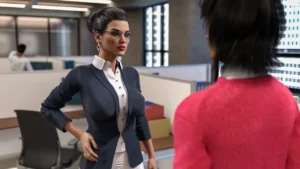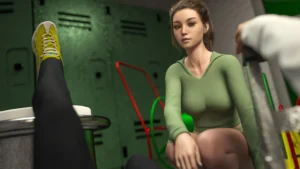
Corporate Culture
Play Corporate Culture
Corporate Culture review
Exploring Story, Characters, and Gameplay in Corporate Culture
Corporate Culture is a story-driven visual novel that immerses players in the life of an ordinary office worker facing a transformative journey. This game blends narrative depth with character development in a corporate-themed modern world setting. If you’re curious about how this game combines storytelling with interactive elements, this article will guide you through its core aspects, gameplay, and what makes it stand out in the visual novel genre.
Understanding Corporate Culture: Story and Characters
Ever felt like your daily grind is stuck on repeat? ☕️ You know the drill: alarm clock, commute, fluorescent lights, endless emails… It’s a life so many of us live, and it’s exactly where the Corporate Culture game story begins. This isn’t just another corporate themed game; it’s a mirror held up to the modern workplace, asking one powerful question: what if you could change your story?
I remember starting my first office job, feeling both excited and utterly lost in a sea of cubicles and unspoken rules. Playing this game was like reliving those early days, but with one crucial difference: agency. This interactive story game puts you in the driver’s seat, transforming a familiar tale of corporate ennui into a thrilling journey of self-discovery. Let’s dive into the world of Corporate Culture and unpack the narrative and people that make it so compelling. 🚀
What is the Plot of Corporate Culture?
At its heart, the visual novel plot of Corporate Culture is a story about transformation. You play as a new hire at the sprawling, and somewhat intimidating, OmniCorp. Your character is the quintessential everyperson—bright-eyed, a little naive, and desperate to make a good impression. The early days are a masterclass in mundane realism: navigating confusing HR paperwork, figuring out the coffee machine that only works for IT, and trying to remember the names of a dozen colleagues who all seem to blend together.
I genuinely laughed during one early scene where my character spent ten minutes trying to find a free meeting room, only to have the meeting canceled. It was so painfully accurate! 😅 But this Corporate Culture game story is far from boring. The genius lies in how it uses this relatable monotony as a foundation.
The major turning point arrives not with a bang, but with a choice. Perhaps you’re asked to cover for a colleague’s mistake, or you stumble upon an email you shouldn’t have seen. Maybe you decide to finally speak up in a meeting instead of staying silent. This moment is the catalyst that shatters the routine. Suddenly, you’re not just a cog in the machine; you’re an active participant in a corporate drama filled with office politics, hidden alliances, and ethical dilemmas.
The key to enjoying this interactive story game is to role-play. Don’t just choose what you think is “right”; choose what your character would do. Are they ambitious? Kind? Skeptical? Your version of the story will be unique.
Your decisions from this point forward shape everything. Will you climb the corporate ladder by any means necessary? Will you try to reform the system from within? Or will you find a way to escape it altogether? The story progression visual novel fans expect is all here, but it’s deeply personalized by your actions.
Who Are the Main Characters?
A visual novel is only as strong as its cast, and the Corporate Culture characters are brilliantly crafted to represent different facets of office life and philosophies. You’ll form friendships, rivalries, and maybe even something more as you navigate your career. The character development in Corporate Culture is nuanced, with each colleague revealing hidden depths and personal motivations based on how you interact with them.
Your relationships with them are the engine of the game. Helping them with projects, choosing to socialize after work, or even disagreeing with them in meetings will alter their perception of you and unlock new story branches. It’s a fantastic simulation of how real workplace relationships function. 🤝
Here’s a quick guide to the key people you’ll meet:
| Name | Role | Personality Traits |
|---|---|---|
| Sarah | Your Mentor | Seasoned, pragmatic, secretly idealistic. Knows all the unwritten rules of the office. |
| Mark | The Rival | Ambitious, competitive, charming. Willing to do whatever it takes to get ahead. |
| Chloe | The HR Manager | Perceptive, empathetic, but bound by corporate policy. Often the voice of reason. |
| David | The Tech Guru | Brilliant, socially awkward, cynical about management. A valuable ally with unique insights. |
✨ Getting to know these Corporate Culture characters is a highlight. I found myself initially distrusting Mark, but after choosing to collaborate with him on a project, I discovered a more complex character who was under immense pressure from management. It completely changed the trajectory of my playthrough!
How Does the Story Progress?
The story progression visual novel mechanics in Corporate Culture are what set it apart from a passive experience. This is a true interactive story game, meaning your choices carry significant weight. The narrative doesn’t follow a single, linear path. Instead, it branches out like a complex flowchart, with key decision points acting as forks in the road.
Your choices typically fall into a few categories:
* Professional Decisions: How you handle assignments, meetings, and conflicts.
* Social Decisions: Who you eat lunch with, whether you attend after-work drinks, and what you talk about.
* Ethical Decisions: The big moral choices that define your character’s integrity.
Each choice you make influences two primary meters often hidden from view: your Professional Standing and your Personal Relationships. A decision that impresses your boss might alienate your coworkers, and vice-versa. There’s no single “best” way to play, which encourages multiple replays to see all the outcomes.
I learned this the hard way! In my first playthrough, I was a relentless go-getter. I said yes to every project, stayed late, and focused solely on promotion. I achieved my goal of a vice president title, but the ending showed my character alone, surrounded by luxury but having burned every personal bridge. It was a hollow victory. 🏆➡️😔
On my second try, I prioritized my relationships with Sarah and David. I made choices that were good for the team, not just for my resume. This led to a completely different ending where my character left OmniCorp with colleagues to start their own venture. The character development in Corporate Culture was focused on collaboration and personal fulfillment rather than pure ambition.
This branching visual novel plot ensures that the Corporate Culture game story is uniquely yours. You might uncover a corporate conspiracy, find love in the break room, or simply learn to master the art of work-life balance. The game’s deep systems ensure that your journey through this corporate themed game is always engaging, always personal, and always full of surprises. The ultimate theme is clear: in the game, as in life, you are the author of your own story. ✍️
Corporate Culture offers a rich narrative experience centered on relatable characters and a compelling story of personal change within a corporate setting. Its focus on story and character interaction makes it a unique visual novel that invites players to explore different paths and outcomes. Whether you’re a fan of story-rich games or looking for an engaging visual novel, Corporate Culture provides hours of immersive gameplay. Dive into the game and experience the journey for yourself.


























